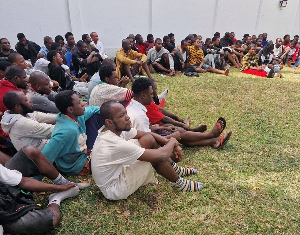(A feature by Francis Ameyibor)
Accra, - In the face of advancing ICT and emerging challenges in voter
registration the Electoral Commission (EC) has taken the bold
decision to replace the current voters register with a biometric
register for subsequent elections.
WHAT IS BIOMETRIC VOTER REGISTRATION
Biometric voter registration involves the use of biometric technologies with
the use of computers, fingerprint scanners and digital cameras to capture the
bio-data of applicants.
Fingerprints are unique to every individual and it is these unique features and
other details that are stored in the computer from which the voters
register is produced.
As done in previous registrations all applicants must be physically
present at designated registration centers (regular polling stations to
be registered as voters).
WHY BIOMETRIC VOTER REGISTRATION?
The old method of registering voters did not has the inbuilt mechanism for
detecting multiple registrations and therefore there were instances
where some unscrupulous individuals registered more than once.
Biometric technology will make the detection and removal of multiple
registrations from the system possible. According to the Electoral
Commission, with this a more accurate and reliable register will be
produced for the elections.
IMPLICATIONS OF THE REPLACEMENT OF THE EXISTING VOTERS REGISTER
Information available to the Ghana News Agency indicates that the upcoming
registration exercise will result in the compilation of an entirely new
voters’ register that will replace the existing one and all previous the voters ID
cards. Every registered voter must therefore be registered anew.
Those who have now turned 18 years are also eligible to register as voters.
WHO QUALIFIES TO REGISTER AS A VOTER?
Only Ghanaian citizens who are: 18 years or above, of a sound mind, resident or
ordinarily resident in an electoral area or are permitted by any law in force from
registering as a voter are qualified to register as
voters.
WHEN WILL REGISTRATION TAKE PLACE?
Registration will start on SATURDAY 24th MARCH anad end on 5TH MAY 2012.
WHERE WILL REGISTRATION TAKE PLACE?
Registration of voters will take place at all registration centers (polling
stations) throughout the country. You are expected to apply for registration in
person at a registration
centre (polling station) in the electoral area where you live.
Remember that your registration center will be your polling station on Election
Day.
HOW WILL REGISTRATION BE DONE?
Dr Kwadwo Afari-Gyan EC Chairman told the newsmen that the
biometric voter registration will be done in clusters simultaneously in
all regions across the country.
“This means that a team of registration officials with a set of equipment
(kit) will be assigned to a number of polling stations in an electoral
area. The team will-operate in a
registration centre (polling station) for a period of ten (10) days and
move to another registration centre (polling station) within the cluster for another
10 days.
“The team will spend 10 days in each registration center (polling station)
until all registration centers (polling stations) in the electoral area
are covered. Electoral areas that are large and have more polling
stations will have two (2) or more registration teams.
“You can see from this arrangement that there is no need to worry if the
registration team is not at our polling station at the start of the
exercise. You will eventually have your turn,” Dr Afari-Gyan noted.
TIME FOR REGISTRATION
Registration will start at 7:00 am and end at 6.00pm each day of the
registration period, including Saturdays and Sundays.
There will not be extension of registration in any registration center after the
10 days allowed. There will however be a limited period for mopping-up.
According to EC mopping-up may entail traveling in some cases. You need not
bring that burden upon yourself, so take advantage of the 10
days that the team will be at your registration centre or polling
station to register as a voter.
THE REGISTRATION PROCESS
As an applicant you must be physically present at the registration centre
to provide the following information to the Registration Officer; Name,
Date of birth,
Age, Sex, Residential address/house number of your present Abode, Name of
parents (dead or alive), Home town/residential address in home town if
different from present abode, and District where hometown is located.
Where you do not have any of the above, two registered voters may swear an
oath and vouch for your eligibility by completing forms.
ELECTRONIC CAPTURE OF FINGERPRINTS
The fingerprints of all your ten fingers will be electronically captured using
a fingerprint scanner. The four fingerprints on the right hand will be captured
first followed by the left hand and finally the two thumbprints.
PHOTO TAKING
In addition to taking your fingerprints, your photograph will also be taken on
the spot. This photograph will be printed on your voter ID card as well as in the
voters register.
ISSUANCE OF VOTER ID CARDS
Unless your application for registration as a voter is challenged, you will be
issued with a voter ID card at the point of registration. Please wait for your ID
card before you leave the registration centre.
If your application for registration as a voter is challenged you will be
issued with a voter ID card only if you are cleared by the District
Registration Review Committee (DRRC) set up in every district to
investigate and determine the challenges.
REGISTRATION CHALLENGES
An applicant’s registration as a voter may be challenged by anybody who
qualifies to be registered as a voter. A challenge on the eligibility of an
applicant to register as a voter
will not stop him/her from going through the process if he/she insists
that he/she is qualified.
The applicant will be allowed to go through the process except that he/she
will not be issued with a voter ID card until the challenge is
determined by the District Registration.
The applicant and the challenger will appear before the DRRC for hearing and
determination of the challenge.
GROUNDS FOR REGISTRATION CHALLENGE
An applicant’s registration may be challenged on the grounds that he/she;
Is not a citizen of Ghana, Is a minor (not 18 years), Is not of a sound
mind, Is not resident in the electoral area, Is already registered as a
voter, and Is not the person he/she claims to be (impersonation).
Others are prohibited by law from registering as a voter.
DISTRICT REGISTRATION REVIEW COMMITTEE (DRRC)
A District Registration Review Committee will be set up in every district to
investigate and determine registration challenges in the respective
districts. An applicant or
challenger who is not satisfied with the decision of the DRRC may appeal to the
Chief Registration Review Officer who is a High Court Judge in
the region for a review of that decision.
CUSTODY OF YOUR VOTER ID CARD
The voter’s ID card is issued primarily for voting. Keep it safely because you
will need it for voting. Do not surrender your ID card to anybody demanding it
unless required by law. You may lose your vote by so doing.
WHAT YOU SHOULD NOT DO
Do not do any of the following as they constitute unlawful acts punishable by
imprisonment;
Do not register or attempt to register as a voter if you are not qualified.
Do not register or attempt to register more than once whether at the same
registration centre or any other centre.
Do not register or attempt to register as a voter in the name of another person,
dead or alive.
Do not by force or threat (physical or spiritual), prevent somebody from exercising
his right to register as a voter.
Do not give false information to a registration officer for the purpose of securing
registration.
Do not forge, willfully deface or destroy any official notice, paper or document
relating to the registration of voters.
Do not print any form relating to the registration of voters without authority from
the Electoral Commission.
Do not disrupt proceedings at a registration centre or in any way
interfere with the work of an official connected with the registration
of voters
Do not bring to the registration centre any electronic device that will
interfere with the performance of the registration equipment.
VOTER ID CARD OFFENCES
It is an offence for any person to be in possession of another person’s
voter ID card without the express consent of that person.
No political party or any organization shall be in possession of the voter ID card
of any of its members or any other person without the express
written consent of that member or person.
Any person who finds a lost voter ID card shall surrender it to the
district officer of the Electoral Commission or a police officer in
charge of the nearest police station within 7 days of the find or else be deemed to
be in unlawful possession of another person’s voter ID card.
A police officer to whom a lost voter ID card has been surrendered shall
surrender it to the district officer of the Electoral Commission within 7 days of it
being given to him or else be deemed to be in unlawful
possession of another person’s voter ID card.
PENALTY FOR UNLAWFUL POSSESSION OF ANOTHER PERSON’S VOTER ID CARD
Any person convicted of unlawful possession of another person’s voter ID
card is liable to a fine not exceeding 500 penalty units or to
imprisonment for a term not exceeding two years for each voter ID card
held unlawfully.
Any political party, organization or group of persons convicted of unlawful
possession of a voter ID card is liable to a fine not exceeding 1000
penalty units for each voter ID card held unlawfully.
GENERAL ADVICE
Register in your electoral area at a center close to your residence
Keep your voter ID card safe and neat for voting on Election Day.
Avoid multiple registrations, since the biometric voter registration system
will expose you and you will be liable for prosecution.
Avoid impersonation.
If you lose your voter ID card report promptly to the police.
Since only qualified Ghanaian citizens are allowed to register as voters it
will be helpful if applicants show one of the following; birth
certificate, baptismal card, passport, drivers license, NHID card,
National ID card or existing voter ID card.
Opinions of Saturday, 17 March 2012
Columnist: Ameyibor, Francis
Biometric Voter Registration – What you should know
Africa













